In the mid-1970s it was briefly fashionable for journalists to write scare stories about the recent cooling of the globe, which was presented as undiluted bad news. Now it is fashionable for them to write scare stories about the recent warming of the globe, which is presented as undiluted bad news. Here are two quotes from the same magazine three decades apart. Can you tell which is about cooling and which about warming? The weather is always capricious, but last year gave new meaning to the term. Floods, hurricanes, droughts – the only plague missing was frogs. The pattern of extremes fit scientists’ forecasts of what a ——world would be like. Meteorologists disagree about the cause and extent of the ——trend, as well as over its specific impact on local weather conditions. But they are almost unanimous in the view that the trend will reduce agricultural productivity for the rest of the century ... The longer the planners delay, the more difficult will they find it to cope with climatic change once the results become grim reality. The point I am making is not that one prediction proved wrong, but that the glass was half empty in both cases. Cooling and warming were both predicted to be disastrous, which implies that only the existing temperature is perfect. Yet climate has always varied; it is a special sort of narcissism to believe that only the recent climate is perfect. (The answer by the way is that the first one was a recent warning about warming; the second an old warning about cooling – both are from Newsweek.)
(...)
Globally, tropical cyclone intensity hit a thirty-year low in 2008. The cost of the damage done by hurricanes has increased greatly, but that is because of the building and insuring of expensive coastal properties, not because of storm intensity or frequency. The global annual death rate from weather-related natural disasters has declined by a remarkable 99 per cent since the 1920s – from 242 per million in the 1920s to three per million in the 2000s.
(...)
The four horsemen of the human apocalypse, which cause the most premature and avoidable death in poor countries, are and will be for many years the same: hunger, dirty water, indoor smoke and malaria, which kill respectively about seven, three, three and two people per minute. If you want to do your fellow human beings good, spend your effort on combating those so that people can prosper, ready to meet climate challenges as they arrive.


